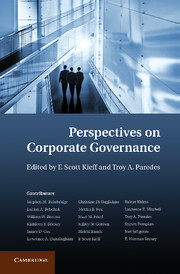Book contents
- Frontmatter
- Contents
- Contributors
- Acknowledgments and Dedication
- PERSPECTIVES ON CORPORATE GOVERNANCE
- Introduction
- PART ONE THE BOARD OF DIRECTORS AND THE CEO
- PART TWO THE WHY, WHEN, HOW, AND HOW MUCH OF EXECUTIVE PAY
- PART THREE CONSTRAINING MANAGERS AND DIRECTORS: INVESTORS, SECURITIES REGULATION, AND THE MEDIA
- PART FOUR DELAWARE VERSUS CONGRESS: ON THE FEDERALIZATION OF CORPORATE GOVERNANCE
- PART FIVE COMPARATIVE CORPORATE GOVERNANCE
- Epilogue: Three Secular Trends of Corporate Law
- Index
- References
Introduction
Published online by Cambridge University Press: 04 August 2010
- Frontmatter
- Contents
- Contributors
- Acknowledgments and Dedication
- PERSPECTIVES ON CORPORATE GOVERNANCE
- Introduction
- PART ONE THE BOARD OF DIRECTORS AND THE CEO
- PART TWO THE WHY, WHEN, HOW, AND HOW MUCH OF EXECUTIVE PAY
- PART THREE CONSTRAINING MANAGERS AND DIRECTORS: INVESTORS, SECURITIES REGULATION, AND THE MEDIA
- PART FOUR DELAWARE VERSUS CONGRESS: ON THE FEDERALIZATION OF CORPORATE GOVERNANCE
- PART FIVE COMPARATIVE CORPORATE GOVERNANCE
- Epilogue: Three Secular Trends of Corporate Law
- Index
- References
Summary
Although a number of factors contributed to the stock market decline that started in 2000 – including the bursting of the “dot-com” bubble, a softer economy than many expected, September 11 and the ongoing terrorist threat, and the wars in Afghanistan and Iraq – one factor that weighed on stocks stands out for present purposes: corporate scandal. Beginning with Enron in the fall of 2001, a wave of corporate scandal crashed on the U.S. economy. In addition to Enron, the scandals involved companies such as WorldCom, Tyco, HealthSouth, Adelphia, and Global Crossing. They also ensnared mutual funds and leading financial institutions up and down Wall Street, along with major accounting firms, such as the collapsed Arthur Andersen. As if the bona fide scandals that made the headlines were not enough to drag the markets down, a record number of earnings restatements – increasing steadily from 116 restatements in 1997, to 158 in 1998, 234 in 1999, 258 in 2000, and 305 in 2001 when the scandals began to break – fueled doubt about companies' governance, finances, and business plans. These doubts became particularly sharp as the overall market tumbled through 2008.
Broad and deep securities markets, where ownership and control are widely separated, depend on a healthy dose of investor confidence to convince investors to hand over trillions of dollars to directors and officers over whom they exercise relatively little influence.
- Type
- Chapter
- Information
- Perspectives on Corporate Governance , pp. 1 - 14Publisher: Cambridge University PressPrint publication year: 2010
References
- 1
- Cited by



